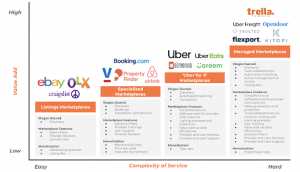In today’s information-driven economies, marketplaces are becoming the natural evolution and final pieces in the logical conclusion of many industries. They are the be-all and end-all aggregators unifying participants of any industry under one umbrella. While marketplace hallmarks are ultimately the same, not all marketplaces are created equal. The space is continuously disrupted in favor of new marketplaces that find novel ways of bringing value to the stakeholders.
The Evolution of the Marketplace:
Defining the value-added of a marketplace is best examined through the stages in the customer experience and features that the platform is able to facilitate a smooth and reliable experience.

In the past 3 decades, marketplaces have evolved from being light-touch platforms to hands-on managers of the service guaranteeing consistency, transparency and efficiency.
The Hallmarks of a Digital Marketplace:
Network Effects: By connecting third-party providers, as well as investing in engagement, reach, and outsourcing the service offered, marketplaces are able to expand rapidly. Marketplaces are able to achieve an equilibrium of demand and supply amongst stakeholders by connecting a highly fragmented base of stakeholders. They can also overcome rampant information asymmetry that undermines the interests of the stakeholders. Through this, stakeholders flock to use the marketplace, creating network effects which further augments the value of the marketplace.

Technology Value Added: By availing technology, through enhanced communication and packaging data insights to enable better decision making, marketplaces are able to enhance stakeholders’ experiences. This achievement of “perfect information” enables higher utilization of assets and transparency.


Unparalleled Experience: Marketplaces that are here to stay enhance the user experience by making the use case as frictionless as possible, ensuring trust on both ends of the marketplace, and actively managing the service to its fruition. This is achieved by building the tools to quickly and simply interact as well as vetting the stakeholders to ensure consistency and reliability.


Economic Advantages: By eliminating information asymmetry, aggregating data, and enabling communication between stakeholders, marketplaces are able to increase economic advantages to all stakeholders of a marketplace. This comes in the form of enhancements to the existing status quo through optimization, but also in the identification and packaging of untapped income – “Found Money” that didn’t exist prior to the marketplace.

With marketplaces becoming increasingly more hands-on, relationships with stakeholders are paramount to truly distinguish a platform and make it immediately applicable. At Trella, we’re deeply in touch with our shippers and carriers and iteratively develop our offering to suit them. Early on, we realized this is not a one size fits all solution and have challenged ourselves on a daily basis to build tailor-made products that empower our partners to make the supply chain more efficient, reliable and convenient. In my opinion, this has become the reason why we’ve continuously beaten ourselves at growing and scaling in the short span of time we’ve been around.
Karim El Deberky
